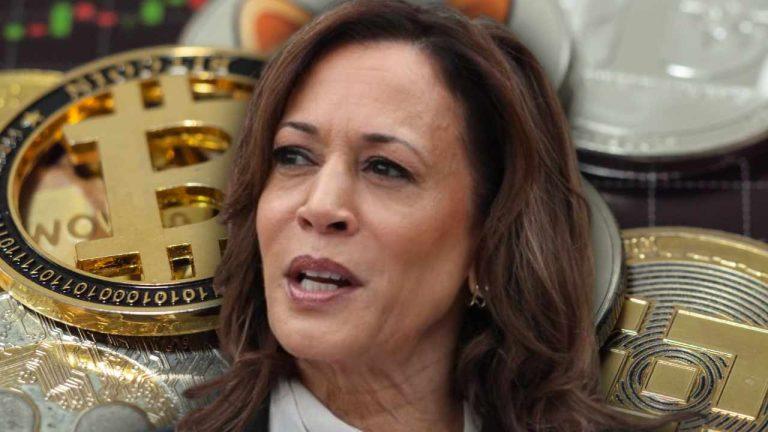 History has shown that great technological shifts create vast wealth. Crypto, the next frontier, is no exception. Decentralized Wealth Will Surpass All Previous Tech Revolutions The first trillionaire will emerge from the crypto world. Like past tech booms created billionaires, crypto will generate wealth on an even larger scale. Blockchain and decentralized finance (defi) are […]
History has shown that great technological shifts create vast wealth. Crypto, the next frontier, is no exception. Decentralized Wealth Will Surpass All Previous Tech Revolutions The first trillionaire will emerge from the crypto world. Like past tech booms created billionaires, crypto will generate wealth on an even larger scale. Blockchain and decentralized finance (defi) are […] Vice President Kamala Harris has pledged to support innovative technologies like artificial intelligence and digital assets while ensuring consumer and investor protection. Her remarks, highlighting AI and cryptocurrency as key aspects of her economic vision, marked her first direct statement on cryptocurrency as the Democratic nominee. Kamala Harris Backs AI and Cryptocurrency at Major Fundraiser […]
Vice President Kamala Harris has pledged to support innovative technologies like artificial intelligence and digital assets while ensuring consumer and investor protection. Her remarks, highlighting AI and cryptocurrency as key aspects of her economic vision, marked her first direct statement on cryptocurrency as the Democratic nominee. Kamala Harris Backs AI and Cryptocurrency at Major Fundraiser […] On Wednesday, billionaire investor Mark Cuban shared on X about Silicon Valley’s growing backing for former President Trump, labeling it a “bitcoin play.” He argued that reduced tax rates and tariffs are likely to boost bitcoin prices. Mark Cuban Calls Silicon Valley’s Support for Trump a ‘Bitcoin Play’ Mark Cuban took to X to address […]
On Wednesday, billionaire investor Mark Cuban shared on X about Silicon Valley’s growing backing for former President Trump, labeling it a “bitcoin play.” He argued that reduced tax rates and tariffs are likely to boost bitcoin prices. Mark Cuban Calls Silicon Valley’s Support for Trump a ‘Bitcoin Play’ Mark Cuban took to X to address […]

Libertarian Argentina has “enormous possibilities” under his leadership, Milei tells Sam Altman.
Argentinian President Javier Milei will meet privately with a number of high-profile figures, including top tech CEOs during a trip to Silicon Valley in California as he tours the United States. He will use the occasions to promote business relations with Argentina, according to press reports.
Milei told OpenAI and Worldcoin head Sam Altman about “the enormous possibilities offered by a libertarian Argentina” during their hourlong meeting on May 28. Alex Blania, co-founder and CEO of Tools for Humanity, the main developer of the Worldcoin project, was also at that meeting. It was Milei’s second meeting with the men. Worldcoin was active in Argentina in the summer of 2023 but faces political opposition.
Other tech luminaries on Milei’s roster include Alphabet’s Sundar Pichai, Meta’s Mark Zuckerberg and Apple’s Tim Cook. Milei will also meet with a group of start-up and AI entrepreneurs and speak at the Pacific Summit.

Chris Dixon, general partner at investment giant Andreessen Horowitz (a16z), says that the crypto industry may be approaching its “iPhone” phase of adoption. In a new interview with Laura Shin on the Unchained Podcast, Dixon references the evolution of the smartphone in the mid-2000s when the iPhone finally delivered a product that would eventually lead […]
The post Executive at $35,000,000,000 Investment Firm Says Crypto Nearing Its ‘iPhone Moment’ – Here’s What He Means appeared first on The Daily Hodl.

AI startup Humane launched the wearable virtual assistant AI Pin that is embedded with technology from OpenAI and cloud computing services from Microsoft.
The artificial intelligence (AI) startup Humane released a physical device on Nov. 10 that serves as a wearable AI virtual assistant.
The AI Pin is a lapel pin-style device that the user wears and taps to speak with a virtual AI-powered assistant. It is equipped with technology from OpenAI, the creator of the well-known chatbot ChatGPT, and has cloud computing capabilities via Microsoft.
According to Humane, users can also interact with the pin via an intuitive touchpad, holding up objects, performing gestures and through its laser ink display that is projected onto the palm.
It says the pin will be able to craft messages in the “tone of voice” of the user, sort emails, provide AI-driven music experiences, and it includes an AI-powered photographer. “Ai Pin can also act as your foreign language interpreter,” it reads, “and support your nutrition goals by identifying food using computer vision.”
In a statement the co-founders of Humane, Imran Chaudhri and Bethany Bongiorno, said:
“Ai Pin is the embodiment of our vision to integrate AI into the fabric of daily life, enhancing our capabilities without overshadowing our humanity.
Humane says it is also launching its own MVNO (mobile virtual network operator) connected by telecom company T-Mobile to provide wireless service for the device.
Related: Biden AI executive order ‘certainly challenging’ for open-source AI — Industry insiders
The pin is available to order in the United States from Nov. 16 and begins at $699 for the entire system, along with a monthly subscription of $24 per month which includes a cell phone number for the pin and cell services.
Humane was founded by ex-Apple employees who worked on the iPhone and has raised $241 million from investments by major players in the space including Sam Altman - CEO of OpenAI- and Microsoft.
The AI Pin comes on the heels of many fast-moving developments in the AI space over the last week.
On Nov. 5 Elon Musk and his AI startup xAI launched chatbot Grok which he said could outperform ChatGPT, which is currently hailed as one of the world’s most advanced chatbots.
The next day OpenAI announced new ChatGPT features that allow subscribers to create their very own GPTs
Magazine: Exclusive: 2 years after John McAfee’s death, widow Janice is broke and needs answers

According to a Bloomberg report, other major depositors included Silicon Valley Bank, SVB Financial Group, biotechnology research company Altos Labs, and China-based firm Kanzhun.
Stablecoin issuer Circle and venture capital firm Sequoia Capital were reportedly among the top 10 depositors at the collapsed crypto-friendly Silicon Valley Bank (SVB) in March.
According to a June 23 report from Bloomberg, the Federal Deposit Insurance Corporation (FDIC) provided documents suggesting that Circle, Sequoia, and others were covered for deposits in the billions of dollars. The Federal Reserve announced following the SVB collapse that it would work with the FDIC to make both insured and uninsured depositors whole — in most situations, the FDIC only insures up to $250,000 per depositor.
Circle reportedly held roughly $3.3 billion in deposits, while Sequoia had roughly $1 billion. Other major depositors included Silicon Valley Bank itself, SVB Financial Group, biotechnology research firm Altos Labs, and Kanzhun Limited — a China-based company behind a major online recruitment platform.
WHOA. The FDIC accidentally posted an un-redacted document showing that the big VC firm Sequoia had $1 billion on deposit at SVB when it collapsed https://t.co/hCbcHZ0yev pic.twitter.com/Ys1qbHnvDr
— Joe Weisenthal (@TheStalwart) June 23, 2023
Related: Circle CEO blames US crypto crackdown for declining USDC market cap
The failure of SVB, and the subsequent collapses of Signature Bank and First Republic Bank, have put a spotlight on how regulators in the United States handle deposit insurance. Though the Fed, FDIC, and Treasury Department said covering SVB and Signature deposits of more than $250,000 was part of a “systemic risk exception”, they have reportedly explored raising the insurance limit.
Following the failure of SVB in March and Circle confirming it had roughly $3.3 billion in exposure to the bank, the firm’s USD Coin (USDC) briefly depegged from the U.S. dollar. In June, the stablecoin issuer announced it planned to launch a native version of USDC on the Arbitrum network.
Magazine: Unstablecoins: Depegging, bank runs and other risks loom

The U.S. president will meet with AI experts to discuss safety, policy and opportunities while he’s in San Francisco.
United States President Joe Biden will discuss artificial intelligence (AI) with a group of Silicon Valley experts on June 20 between campaign fundraising stops in California.
The president will meet with at least eight experts, including renowned researchers and experts in AI safety. According to the White House, the topic of discussion will be the Biden administration’s “commitment to seizing the opportunities and managing the risks of Artificial Intelligence.”
Per a report from The Associated Press, the attendee list includes Jim Steyer, founder of Common Sense Media; Tristan Harris, co-founder of the Center for Humane Technology; Fei-Fei Li, co-director of Stanford’s Human-Centered AI institute; Joy Buolamwini, founder of the Algorithmic Justice League; and Sal Khan, founder of the Khan Institute.
Related: US vice president gathers top tech CEOs to discuss dangers of AI
This group is noteworthy for its individual members’ efforts in education, policy, safety and harm mitigation. Previous meetings with White House officials have included CEOs from some of the largest companies in the global AI sector — including meetings with representatives from Google, Microsoft and Anthropic.
Biden will meet with the experts at 4:00 pm Pacific Standard Time on June 20, during a series of discussions the president is participating in at the Fairmont Hotel in San Francisco. The event will be streamed on the official White House YouTube channel.
The U.S. Senate recently met with OpenAI CEO Sam Altman, IBM chief privacy and trust officer Christina Montgomery and New York University’s Gary Marcus in a hearing to discuss AI policy.
During his testimony, Altman expressed his belief that the U.S. government should establish a federal regulatory body to provide oversight, licensing and accountability for the burgeoning AI sector. While Marcus agreed with the notion, IBM’s Montgomery dissented, stating that it was her company’s view that Congress should take a more surgical approach to AI governance.
The discussions surrounding AI come at a time when the U.S. government has yet to set a comprehensive strategy for legislating AI development and production.
While Europe, China and the United Kingdom have either passed or are currently weighing bills featuring overarching legislation packages for the AI sector, the U.S. still lags behind in both comprehensive cryptocurrency and AI regulations.
Untangling the two sectors is becoming increasingly difficult, as AI now underpins many cryptocurrency, blockchain and Web3 industries.
Related: AI has a ‘symbiotic relationship’ with blockchain: Animoca Brands CEO

Michael Clements said the GAO had reviewed “large deposits from the digital asset space” in considering whether crypto had contributed to Signature’s failure.
The United States Government Accountability Office, or GAO, has released its preliminary review of the failures of Silicon Valley Bank and Signature Bank — and included exposure to deposits from the cryptocurrency industry.
In a report released on May 11, the GAO said “poor governance and unsatisfactory risk-management practices” led to the collapse of Signature Bank in March. The GAO did not explicitly report that digital assets were the cause of the bank’s failure but mentioned exposure to the crypto industry alongside potential reasons.
“Signature Bank had exposure to the digital assets industry and declining liquidity in the months prior to failure,” said the report. “FDIC staff said Signature Bank management was unable to fully understand the bank’s liquidity positions in the days and hours before failure.”
Though the GAO largely did not mention the crypto-friendly Silvergate Bank, which went into voluntary liquidation in March, the report said Signature was “perceived to be similar.” Signature held roughly $12 billion in deposits connected to digital asset firms in 2022 but intended to reduce its exposure to the crypto industry.
U.S. lawmakers discussed oversight of the failed banks in a May 11 hearing, in which GAO director of financial markets and community investment Michael Clements said bank regulators had identified concerns with Silicon Valley Bank and Signature Bank before their collapse but “did not escalate supervisory actions in time.” In response to questioning from Tennessee Representative John Rose, Clements said the GAO had reviewed “large deposits from the digital asset space” in considering whether crypto had contributed to Signature’s failure.
“[Signature] was simply holding deposits and operating the accounts,” said Clements. “Following some of the turmoil in 2022, particularly FTX, some of those deposits did start to fall off.”
Different regulators have put forth their own views on the potential connection between exposure to crypto and the collapse of these banks. Adrienne Harris, superintendent of the New York Department of Financial Services, reportedly said any connection between Signature’s failure and crypto was “ludicrous,” describing the events as more of a traditional bank run.
Related: More than 186 US banks well-positioned for collapse, SVB analysis reveals
Many regulators and lawmakers continue to invoke the collapses of Signature Bank, Silicon Valley Bank and Silvergate Bank in discussions around crypto. Following the bank failures, crypto firms including BlockFi and Gemini released statements claiming to have had sufficient funds to offset exposure or no exposure at all.
Magazine: Unstablecoins: Depegging, bank runs and other risks loom

Cointelegraph’s Elisha Owusu Akyaw shares how cryptocurrency is changing the financial landscape in Africa — and the opportunities and challenges that come with it.
The cryptocurrency space has no shortage of skeptics. While many people criticize the environmental impact of proof-of-work blockchains or the proliferation of scams, one particular argument against crypto often stands out: Blockchain has no real use cases.
Every two weeks, Cointelegraph’s The Agenda podcast breaks down this critique and explores the various ways blockchain and crypto can help everyday people.
On this week’s episode of The Agenda, hosts Jonathan DeYoung and Ray Salmond chat with Elisha Owusu Akyaw, Cointelegraph’s own social media specialist and host of the Hashing It Out podcast, to break down how Africans are using crypto to strengthen financial inclusivity and potentially turn countries into hubs of technological innovation.

According to Akyaw, crypto offers a more convenient, affordable way to send money both regionally and around the world. “Western Union, MoneyGram and all of these money transaction firms or rails have made millions from Africa for so long” by charging high fees, said Akyaw, whereas the cost required to send money via crypto is significantly lower.
Bitcoin (BTC) also offers a better store of value for most Africans than local fiat currencies, Akyaw argued. Speaking on his own experience of living in Ghana, he said that “you can buy Bitcoin and keep it for the next one year or six months. It’s a better hedge against inflation than keeping the Ghanaian cedi.”
Finally, the crypto industry is opening up new opportunities on the continent. “At every point of development, Africa has been left behind,” said Akyaw. But the global nature of the industry and the fact that it’s still in its early development present a unique opportunity to participate and benefit from its growth.
“This is one of the first times where there is a big shift happening and Africans are able to contribute. Africans are able to benefit directly from the shift that is happening without it having to pass through an intermediary, which is usually the state. And I think it’s an amazing thing.”
When asked about what it would take for countries in Africa to become “magnets for crypto builders or a new kind of Silicon Valley,” Akyaw pointed to two factors that need to be improved for developers, startups and fintech companies to want to make the continent their home: regulation and infrastructure.
Umm. So I met @jack at the @AfroBitcoinOrg Conference.
— Elisha - GhCryptoGuy (@ghcryptoguy) December 5, 2022
I have been smiling since pic.twitter.com/SJKjkU6nAb
The majority of African countries lack proper regulation, according to Akyaw, while also condemning the use of crypto. This means companies are often unable to obtain licenses to set up shop and residents are dissuaded from interacting with Web3 protocols and firms:
“You can’t get a license. You can’t work with a bank in the country. You can’t do a lot of things. So, it makes no sense for you to come in.”
The other thing that needs to change, said Akyaw, is that electric grids need to be more stable and internet needs to be more reliable. “If you want a lot of Big Tech companies to come in, they must have great, 24/7 electricity. Internet must be awesome because a lot of what we do in the crypto space is virtual.”
To hear more from Akyaw’s conversation with The Agenda — including his backstory, whether outside funding has any negatives and the potential near-term future of crypto in Africa — listen to the full episode on Cointelegraph’s Podcasts page, Apple Podcasts or Spotify. And don’t forget to check out Cointelegraph’s full lineup of other shows!
Magazine: Unstablecoins: Depegging, bank runs and other risks loom